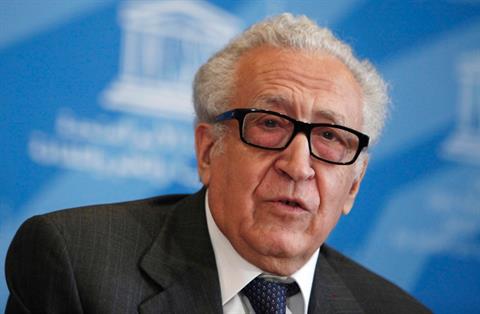Brahimi wants late November Geneva conference
Arab League peace envoy Lakhdar Brahimi Sunday urged Syria’s warring parties to hold talks “without preconditions” and said he hoped negotiations could take place in Geneva in late November.
Brahimi’s call came after both sides to the conflict stated their conditions over the weekend for joining a peace conference – President Bashar Assad said he wouldn’t sit down with armed terrorists, while senior rebel leaders said they would only take part if Assad’s departure from power was “guaranteed” by Arab and Muslim countries.
In an interview with French-language television channel TV5 Monde, Brahimi also expressed deep frustration with the stalled Syria peace process, admitting he feels like resigning from the post.
Asked during the interview about plans for the U.N.-backed peace talks in November, Brahimi said: “There is no certainty.
“I am trying to invite everyone for the second half of November … We’ll see. I’m a realist.”
World powers are urging Syria’s regime and opposition to take part in the long-sought peace talks, which are aimed at launching a political transition to end the country’s civil war.
Brahimi dismissed the idea that either side in the conflict should be able to set down conditions prior to the proposed talks.
“We are going to Geneva without preconditions. Mr. Bashar Assad cannot say that he does not want to negotiate with ‘X’ or ‘Y’ and it’s the same thing for the opposition,” Brahimi said.
The proposed peace conference – dubbed Geneva II – would be to decide how to implement a declaration agreed by the major powers in the Swiss city in June 2012 that there has to be a transitional government in Syria.
At least all five permanent members of the U.N. Security Council – Britain, China, France, Russia and the United States – are expected to be involved in the talks and Brahimi said other key countries could take part.
“Iran and Saudi Arabia should be present at Geneva II,” Brahimi said.
He said he had discussed the issue with Iranian President Hassan Rouhani and that while Tehran wanted to be at the talks, it was “not the end of the world” if Iran did not attend.
Voicing frustration at the difficulties in getting the two sides to sit down, Brahimi said: “It is almost an impossible mission.
“I feel like resigning because it is very difficult, we are not moving forward, people don’t listen to me, but on the other hand, as long as there is a small hope I don’t have the right to go.”
Brahimi’s comments followed Assad’s latest dismissal of the option of sitting down with armed rebels who have advocated foreign intervention in the civil war.
During a rare interview with Syrian government newspaper Tishrin, Assad was asked about whether Damascus had conditions for taking part in Geneva II.
“We have no conditions except that there should be no negotiations with terrorists, weapons must be laid down, and there must be no calls for foreign intervention,” he said in the interview, published on the occasion of the 40th anniversary of the October War.
Assad said all dates for convening Geneva II remained “theoretical,” adding that no specific proposals for the content of the conference had surfaced. He predicted that the United States would “continue to stall” when it came to organizing the conference and seeing it actually take place.
The Syrian president said the American government had been unable to engineer significant rebel military achievements on the ground, which “it thought were necessary to arrive at Geneva II.”
Assad reiterated the argument that his regime was engaged in a war against extremism, a phenomenon he called “more destructive” than weapons of mass destruction.
The interview came one day after a meeting in Istanbul of the Turkey-based senior leadership of the rebel Free Syrian Army, which demanded guarantees from Arab and Muslim states that Assad’s departure would be a part of Geneva II.
The Supreme Military Council of the FSA also called for unity within the armed opposition to Assad, after several prominent rebel brigades rejected the opposition National Coalition umbrella group.
The SMC said it continued to reject “dialogue with the terrorist regime in Syria.” It said the “minimum acceptable” would be negotiations with Arab and Muslim states that adhered to Coalition conditions: “The need for Assad to step down, a transfer of power, and bringing to justice those who have committed war crimes against the Syrian people.”
The SMC also said it had decided to “issue a call for closing ranks, renouncing division, and … rejecting all kinds of dissension caused by trying to separate the political wing from the military one.”
Ahmad Jarba, the president of the National Coalition, joined the military officials for several days of meetings prior to Saturday’s announcement.
The statement came after 13 rebel brigades, including prominent groups that work with the Military Council, rejected the authority of the Coalition.
Powerful brigades including Tawhid, Islam and Ahrar al-Sham joined the Al-Qaeda-affiliated Nusra Front in rejecting the Coalition, saying it “does not represent us, nor do we recognize it.”
They did not refer to the SMC.
The SMC statement reiterated “the need to respect institutions of the Syrian Revolution; primarily the National Coalition.”
The decision of the 13 groups to reject the Coalition was seen by some as a response to increasing pressure on them to participate in negotiations with the regime.


